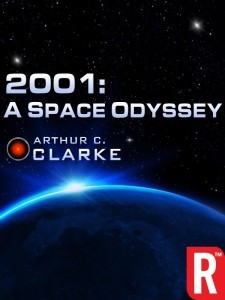The year is 2001, and cosmonauts uncover a mysterious monolith that has been buried on the Moon for at least three million years. To their astonishment, the monolith releases an equally mysterious pulse—a kind of signal—in the direction of Saturn after it is unearthed. Whether alarm or communication, the human race must know what the signal is—and who it was intended for.
The Discovery and its crew, assisted by the highly advanced HAL 9000 computer system, sets out to investigate. But as the crew draws closer to their rendezvous with a mysterious and ancient alien civilization, they realize that the greatest dangers they face come from within the spacecraft itself. HAL proves a dangerous traveling companion, and the crew must outwit him to survive.
Review:
I haven’t read much science fiction, but I’m continuously awed by how incredibly devoted it is to instruction. Most fiction seeks to entertain or to describe or to prod, either intellectually or emotionally. Science fiction, on the other hand, wants to educate. Its readers are learners, its authors teachers. And the class syllabus is vast: it covers subjects like the functioning of planetary orbits or astronaut behavior in zero gravity, yet I’m tempted to label this area of instruction as pedestrian next to the genre’s equal fascination in the most profound questions of our species. Here we’re mostly concerned with answering this one: Are we alone in this vast universe? Thankfully, Clarke quickly dismisses this possibility as ridiculously impossible. That way we focus on the more interesting question: if we’re not alone, what does this mean for our future?
In 2001, the prospect of celestial neighbors does not only have significance on our future, it affects our past. One of the most terrifying theories proposed by the Search for Extraterrestrial Intelligence is the Zoo Hypothesis, the idea that intelligent life is out there, but it’s so advanced that our planet is nothing more to them than a cage of lions at the zoo is for us humans. Clarke’s novel plays on this idea, though not as sinisterly as he could have.
The most sinister part of the novel is HAL, the onboard space shuttle computer who controls the management of the entire vessel with his extrahuman artificial intelligence. The midbook sequence where he takes a prime role in the future of humanity and its role among the stars is the most rollicking and also the most educational part of the novel. The main intrigue of 2001 is that some advanced extraterrestrial species had a hand in speeding up the evolution of humans millions of years ago, setting us on course, essentially, to one day meet them elsewhere in the universe. Eerie parallels emerge when you consider the idea of supersmart computers like HAL. Has our species reached a point where we are now advanced enough to not only influence other forms of life, but to create other forms of life? Wisely, this is one of the points in the novel where Clarke seeks to educate but not by providing us any semblance of an answer.
Where this novel fails is its journey from science (fiction, of course, but still science) to a psychedelic, almost pious ending scenario. It’s a common ending found in other scifi works (Sagan’s Cosmos comes to mind) in which humanity leaps into the heart of the universe and finds something so wonderful and so mysterious that it’s inevitably cast with a godlike hue. I agree: the universe is wonderful and mysterious, but I wonder why science fiction authors have to depict our profound, long-awaited discoveries of its secrets in the same way an ancient monk once wrote “Let there be light!” as the first sentence in the Bible.
The universe is amazing, and Clarke’s 2001 shows us a fictional example of why that’s so. Shouldn’t that be enough?


